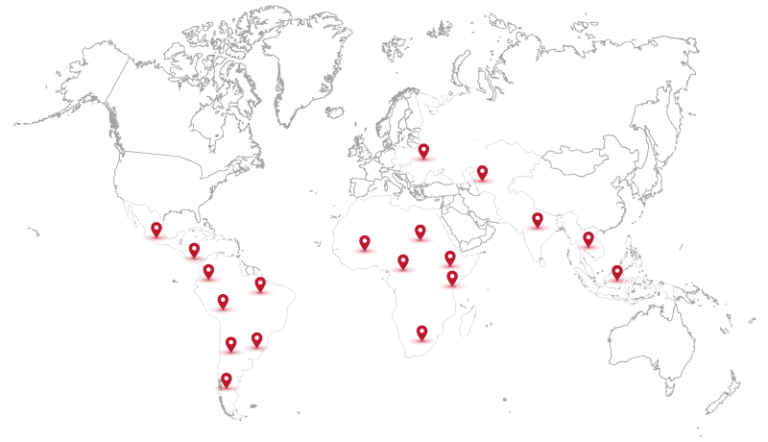As adopted by the HNI Congress in Kathmandu, Nepal, on 28TH April 2023
I. INTRODUCTION:
We, the 72 out of 75 affiliates of HomeNet International, an international network of membership-based organizations, federations, networks and alliances of home-based workers from 33 countries met in Kathmandu from the 25th to the 28th April 2023 at our Second Congress, and adopted this Declaration
The main objective of the Congress was to deepen the solidarity and unity of the home-based workers movement that we built in our on-line activities during the pandemic.
Our vision is for greater visibility and recognition of home-based workers and for a strong, united, and representative voice on global platforms where home-based workers effectively engage and challenge those, such as governments and employers, who have power over their working lives.
We note that despite there being more than 260 million home-based workers, representing 8 percent of the global workforce, they remain invisible, marginalized and denied their rights.
II. CONFIRMATION OF HOMENET INTERNATIONAL’S CONSTITUTION:
We unanimously endorsed our Constitution adopted at our Virtual Congress on 24th February 2021 and are committed to the principles and objectives mentioned therein. We reinforce our resolve to build and provide solidarity among home-based workers and their organisations around common issues and to provide a representative voice on global platforms.
III. OUR DEMANDS:
A. Recognize home-based workers and their contribution:
- Recognize home-based workers as workers – both the self-employed HBWs and those who are subcontracted workers (with or without an employment contract), the majority of whom are women
- Recognize the contribution of HBWs to their family’s income and to community and national economies.
- Recognize the rights of HBWs to freedom of association, especially into membership-based organizations, and collective bargaining.
- Recognize the right of HBWs and their organisations to participate in and be heard while formulating and implementing policies concerning them.
B. Ratify and implement ILO Standards:
- Ratify and implement International Labour Organisation (ILO) Convention 177 on Home Work and ILO Convention 190 on Eliminating Violence and Harassment in the World of Work as well as other ILO Conventions like C-87 and C-98.
- Implementation of Recommendation 184 on Home Work and Recommendation 204 on Transition from the informal to the formal economy.
C. Provide Social Protection – our labour right!
Most home-based workers are not covered, or inadequately covered, by government or employer social protection schemes. Our health and safety is often compromised due to poor working spaces and facilities, and the stress of juggling unpaid and paid work. We demand the right to social protection including:
- A legal, policy framework on social protection
- Quality and affordable health care
- Financial support for maternity, old age, disability and unemployment
- Access to affordable and quality child care facilities
- Insurance including for life, accident, health and tools & equipment.
- Relief packages during disasters and for recovery and rehabilitation.
- Protection from gender based violence.
- Support for improved occupational health and safety through provision of safe production processes, personal protective equipment, better housing, infrastructure, collective working spaces and training.
D. Build inclusive Global Supply Chains:
Home workers are part of global supply chains, especially the global garment supply chains. HBWs demands are:
- Recognition as legitimate workers contributing to the production of goods as an intrinsic part of the supply chains.
- Provision of mandatory written work contracts from primary employers (brands) or brands must contractually oblige their suppliers to do this.
- Equal pay for equal work for women and men workers
- Decent work (including a living wage) – all employment benefits that are enjoyed by factory workers in the same supply chain must be extended to homeworkers.
- Transparency through the supply chains.
- Right to organize and/or join trade unions of workers through the supply chains.
- A transparent and fair complaints redressal mechanism with home-based workers organization’s active and effective participation.
E) Strengthen statistics on home-based workers at the global and national levels:
Governments should collect and publish comprehensive statistics by:
- Including a question on ‘type of workplace’ as well as the category of “dependent contractor” to accurately categorize home-based workers in National Labour Force Surveys.
- Identifying accurately contributing family workers
- Including data on home-based workers by sex and industry categories in tabulation releases of the labour or other household surveys
IV. OUR COMMITMENTS:
F) Build strong and democratic organizations of home-based workers:
Home-based workers need visibility, recognition and representative voice if they are to gain recognition as workers and improve their economic and social conditions. They need solidarity amongst themselves and with other worker organizations. To achieve this they must organize into strong, democratic membership-based worker organizations at all levels, from local to global. HNI and its affiliates commit to supporting:
- Local HBW organizations to grow their membership, deepen their democratic functioning, empower members and improve livelihoods.
- Building capacity of HBWs in leadership especially for women, in organisational skills and providing opportunities for information sharing on organising models and strategies.
- Organizations coming together to form more visible and powerful national and regional organizations/networks.
- Continuing to grow and strengthen HNI as the global voice of home-based workers.
- Alliances with the trade unions and organizations of the social and solidarity economy.
G) Strengthen access to Markets
Home-based workers, especially own account home-based workers, have direct access to raw materials and markets. However, post the pandemic availability of the raw material has been inconsistent and expensive, and the demand for the products made by home-based workers has been low. HNI commits to working with regional organizations and affiliates to:
- Build the capacity of home-based workers and their organizations on various skills to ensure that their products are “market ready” and the organizations have the capacity to sell their products directly to the markets.
- Create visibility of products made by home-based workers
- Identify different markets and facilitate the relationship between the HBWs organizations and markets.
- Network with like-minded organizations to create a support group for HBWs organizations.
- Building capacities (like for digital literacy) of home-based worker’s organisations to access markets.
- Advocate for policies to support the livelihood of HBWs (eg. revolving fund, procurement)
H) Promote Livelihoods through the Social Solidarity Economy
Home-based workers’ organise themselves as Social Solidarity Economy organizations such as cooperatives, producer owned companies and self-help groups. They have social objectives, are organized democratically with ownership by HBWs and for economic sustainability. However, they are in most cases small. They lack regulations to protect them and support programmes to promote them. Therefore, HNI commits to
- Continue its support in organising home-based workers as SSE organisations
- Advocate for policies to support Social Solidarity Economy
I) Include home-based workers and their issues in Climate Change discourse and advocacy:
Climate change has become an urgent, widely debated global issue. Some of those most affected by climate change are the home-based workers from the global south, living and working in informal settlements and rural areas and directly affected by extreme heat, floods, droughts, land degradation and pollution. Their concerns are largely ignored.
HNI commits to working with its regional organizations and affiliates to:
- Conduct research on the impact of climate change on home-based workers across different regions and different sectors.
- Organize around the issue of climate change and build a platform of demands at the local, national and global level.
- Build the capacity of HBWs to understand, articulate and engage in local, national and global dialogues and negotiations on climate change
- Advocate for climate change policies that are gender sensitive and inclusive of demands of HBWs.
We therefore call for:
National Governments to recognize home-based workers as workers, their contribution to local and national economies, to formulate and ensure implementation of national laws and policies for them, ratify ILO Convention No. 177 and 190, include them in national statistics, take responsibility for social protection and give them a voice in decision making.
Trade Unions to include home-based workers as their members, help them to build their own organizations and to advocate for ratification of the ILO Conventions No. 177, C-190 and Recommendation 204.
The private sector brands and employers to recognize the existence of home workers in their supply chains; mandate written work contracts; to ensure fair income and decent work including social protection and a transparent and fair complaints redressal mechanism.
International development agencies to recognize home-based workers and include their rights and concerns in their policies and programmes; to support organizations and regional networks of home-based workers to combat invisibility and exploitation and counter the negative effects of globalization; lobby and support governments to ratify ILO C-177 and put pressure on large corporate buyers to improve conditions of employment for home workers
WE ARE MANY, WE ARE UNITED, WE ARE HOMENET INTERNATIONAL!
Download in: English, Spanish, Portuguese, Russian, Serbian



